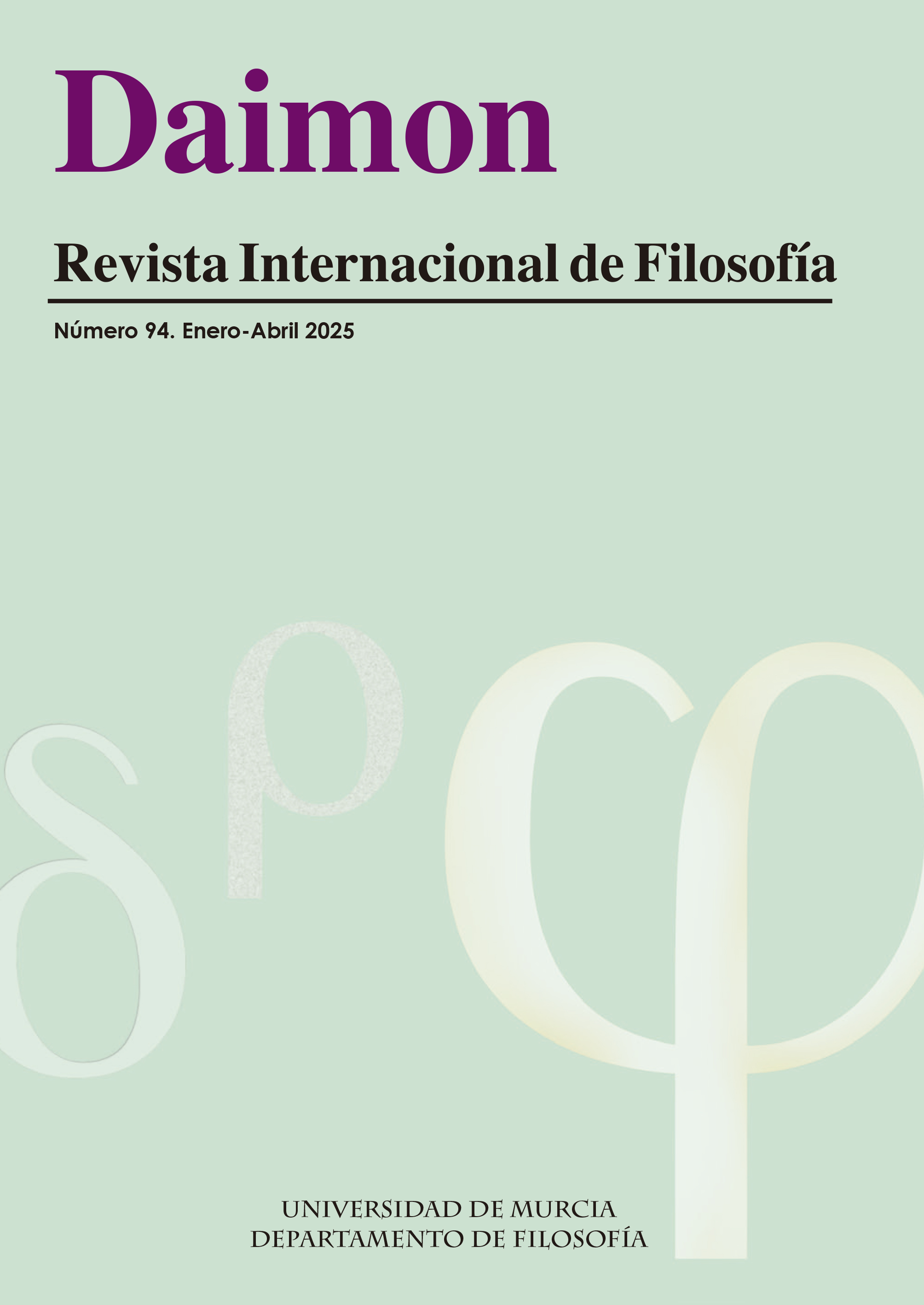La voluntad de la emoción. Cólera y pensamiento en la concepción aristotélica de la voluntariedad práctica
Agencias de apoyo
- Este trabajo ha sido producido en el marco del Proyecto UBACyT 2020-2022 (Mod. II 20020190200017BA).
Resumen
Es harto conocido el análisis aristotélico de las distintas clases de acción humana en función de su voluntariedad e involuntariedad en Ética nicomaquea III, 1. Algo que suele llamar la atención de los especialistas es la inclusión de las acciones emocionales entre las voluntarias. En el presente trabajo intentaré dar cuenta de las razones para dicha inclusión, argumentando que surgen del marco racional que orienta la acción emocional, marco en función del cual Aristóteles puede catalogarlas como voluntarias.
ABSTRACT
The Aristotelian analysis of the different kinds of human action according to their voluntariness and involuntariness in Nicomachean Ethics III, 1 is well known. Something that usually draws the attention of specialists is the inclusion of emotional actions among the voluntary ones. In this paper I will try to show the reasons for such inclusion, arguing that they arise from the rational framework that guides emotional action, a framework based on which Aristotle can classify them as voluntary.
Descargas
-
Resumen393
-
PDF311
-
HTML71
Citas
Aubenque, P. (1957). Sur la définition aristotélicienne de la colère. Revue Philosophique de la France Et de l'Etranger 147, 300-317.
Boeri, M. (2007). Apariencia y realidad en el pensamiento griego. Colihue.
Broadie, S. (1991). Ethics with Aristotle. Oxford University Press.
Chamberlain, C. (1984). The meaning of prohairesis in Aristotle’s Ethics. Transactions of the American Philological Association CXIV, 147-157.
Cooper, J.M. (1988). Some remarks on Aristotle’s moral psychology. The Southern Journal of Philosophy XXVII, 25-42.
Dow, J. (2015). Passions and persuasion in Aristotle’s Rhetoric. Oxford University Press.
Dyer, R.R. (1965). Aristotle’s categories of Voluntary Torts (EN 1135b8-25). The Classical Review XV, 3, 250-252.
Feldblyum, V. (2016). Aristotle on Thumos and Phantasia. Ithaque XVIII, 1-23.
Fillion-Lahille, J. (1970). La colère chez Aristote. Revue des Études Anciennes LXXII, 1-2, 46-79.
Fortenbaugh, W.W. (1970a). Aristotle’s Rhetoric on emotions. Archiv für Geschichte der Philosophie LII, 1, 40-69.
Fortenbaugh, W.W. (1970b). On the Antecedents of Aristotle’s Bipartite Psychology. Greek, Roman and Byzantine Studies 11, 233-250.
Fortenbaugh, W.W. (1974 [2002]). Aristotle on Emotion. Duckworth.
Fortenbaugh, W.W. (2006). Aristotle’s practical Side. On his Psychology, Ethics, Politics and Rhetoric. Brill.
Harris, W.V. (1997). A note on Aristotle’s definition of Anger. The Classical Quarterly XLVII, 2, 452-454.
Hicks, R.D. (1907). Aristotle. De anima. Cambridge University Press.
Irwin, T. (1980). Reason and Responsibility in Aristotle. A.O. Rorty (ed.), Essays on Aristotle’s Ethics (pp. 117-156). University of California Press,.
Irwin, T. (1999). Aristotle Nicomachean Ethics. Translated, with introduction, notes and glossary. Hackett.
Knuuttila, S. (2004). Emotions in Ancient and Medieval Philosophy. Clarendon Press.
Konstan, D. (2003). Translating ancient Emotions. Acta Classica XLVI, 5-19.
Konstan, D. (2004). Aristotle on anger and emotions. S. Braun, S. & G. Most (eds.), Ancient Anger. Perspectives from Homer to Galen (pp. 99-120). Cambridge University Press.
Lorenz, H. (2009). Virtue of Character in Aristotle’s Nicomachean Ethics. Oxford Studies in Ancient Philosophy XXXVII.
Mathieu-Castellani, G. (2001). La colère d'Aristote. Défense et illustration d'un emportement plus doux que le miel. Litterature CXII, 2, 75-89.
Cope, M. & Sandys, E. (1877 [2009]), Aristotle. Rhetoric, Cambridge University Press.
Nussbaum, M. (1986 [1995]). La fragilidad del bien. Visor.
Nussbaum, M. (2014 [2018]). La ira y el perdón. FCE.
Polanski, R. (2007). Aristotle’s De anima. Cambridge University Press.
Ramos-Umaña, L. (2022). Filosofía del deseo. Aristóteles y el thymós. Tópicos LXII, 65-95.
Rossi, G. (2018). The Causal Structure of Emotions in Aristotle: Hylomorphism, Causal Interaction between Mind and Body, and Intentionality. M. Boeri et al. (eds.), Soul and Mind in Greek Thought. Psychological Issues in Plato and Aristotle (pp. 177-198), Springer.
Sherman, N. (1991). The Fabric of Character. Clarendon Press.
Shields, C. (2016). Aristotle. De anima. Clarendon Press.
Sihvola, J. (1996). Emotional animals: Do Aristotelian emotions require beliefs? Apeiron 29, 105-144.
Sinnot, E. (2007). Aristóteles. Ética nicomaquea. Colihue.
Simpson, P.L.P. (2014). The Great Ethics of Aristotle. Routledge.
Vigo, A. (1999). Incontinencia, carácter y razón según Aristóteles. Anuario filosófico 32, 59-105.
Derechos de autor 2024 Daimon Revista Internacional de Filosofia

Esta obra está bajo una licencia internacional Creative Commons Reconocimiento-NoComercial-SinObraDerivada 3.0.
Las obras que se publican en esta revista están sujetas a los siguientes términos:
1. El Servicio de Publicaciones de la Universidad de Murcia (la editorial) conserva los derechos patrimoniales (copyright) de las obras publicadas, y favorece y permite la reutilización de las mismas bajo la licencia de uso indicada en el punto 2.
2. Las obras se publican en la edición electrónica de la revista bajo una licencia Creative Commons Reconocimiento-NoComercial-SinObraDerivada 3.0 España (texto legal). Se pueden copiar, usar, difundir, transmitir y exponer públicamente, siempre que: i) se cite la autoría y la fuente original de su publicación (revista, editorial y URL de la obra); ii) no se usen para fines comerciales; iii) si remezcla, transforma o crea a partir del material, no podrá distribuir el material modificado.
3. Condiciones de auto-archivo. Se permite y se anima a los autores a difundir electrónicamente las versiones pre-print (versión antes de ser evaluada) y/o post-print (versión evaluada y aceptada para su publicación) de sus obras antes de su publicación, ya que favorece su circulación y difusión más temprana y con ello un posible aumento en su citación y alcance entre la comunidad académica. Color RoMEO: verde.











